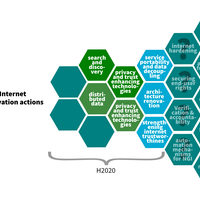Next Generation Internet initiative - Year Zero
Come work for the internet on privacy, trust, search & discovery
- Track: Lightning Talks
- Room: H.2215 (Ferrer)
- Day: Sunday
- Start: 14:40
- End: 14:55

Last year during a FOSDEM keynote Michiel Leenaars, director of strategy at NLnet foundation, introduced the Next Generation Internet initiative together with member of the European parliament Marietje Schaake. NGI aims to be the first concerted effort to put significant public funding to hands-on work to really fix the internet. Meanwhile, the project is on its way. On December 1st 2018, the first open calls opened with funding for independent researchers and developers working on free and open source projects in the area of privacy and trust enhancing technologies and on search, discovery and discoverability. In this talk Leenaars, project lead of NGI Zero that is currently offering 11.2 million euro in grants, will tell everything you need to know about the various open calls that you can apply for. With grants ranging from 5.000 euro to 50.000 euro available for research, development and engineering effort NGI Zero aims to lead the push toward the post-Snowden internet we want.
From the humble four nodes of the ARPANET that were bootstrapped half a century ago this year, until today, the internet has grown at a breathtaking pace. But while the technology has gradually penetrated every aspect of our lives, it has become clear that not all is well and at least some part of its growth has spiraled out of control. In fact, web inventor Tim Berners-Lee has recently called the current state of his creation (and by extension the larger internet) "dystopian".
The internet of especially the last fifteen years has brought about undesirable concentration of power ("winner takes all"), and while it has given us many good things has also caused loss of human agency in many other realms. Internet has given the world totalitarianism the likes of which it has never seen, has enabled political manipulation at unprecedented scale affection the lives of hundreds of millions of people. Internet has eroded the private sphere to the point where it has been declared dead, and the mantra of 'big data' and business analytics frame the discussion we should be having. Due to its open global nature and the wholly new types of economic dominance neither internet users nor governments both have an adequate answer against dominant super-actors. How dow we stop large scale abuse of power. Have the web and the internet become "anti-human" as Berners-Lee posits? And what can we do about it?
The internet is not going to fix itself. Many of the more promising efforts in this realm have been 'bottom up' efforts from individuals or small teams, but these isolated efforts certainly have missed critical mass to actually scale up and change the mainstream internet and the commercial landscape where powerful actors are fully vested in the current course. The Next Generation Internet initiative aims to bring those efforts together, strengthen and unite them and turn them into something that can be deployed across the whole internet. Let there be no doubt about it: fixing the internet is an insane 'moonshot++' effort: the internet is the largest technical structure man has ever made, and the task at hand is to vastly improve its very operating fabric with > 3 billion people using it on a daily basis.
And yet we have to: fixing the internet is essential to safeguard our economy and create a more resilient and robust infrastructure. And even more importantly we also depend on it to upholding our way of life. How the internet, the web and the mobile ecosystems work directly impacts our human values. Crafting a better internet is essential for maintaining basic human rights such as privacy for the near-future Europe.
Surely, a larger political agenda of Europe should be an integral part of the approach - in some cases regulating the most predatory behaviour from bad actors might be the only thing left to put the genie back in the bottle and to restore health back to the internet. However, it is also clear that a significant part of the solution lies in the hands of technologists. NGI Zero is probably the first funding programme of its scale that is entirely based on the principles of free/libre, open source software. We need smart and resourceful people that come and work for the internet. Could this be you? In this talk Michiel Leenaars will explain how the funding works, and how NGI Zero deals with important issues like localisation, accessibility, security, packaging, documentation, responsible disclosure and more. Come and work for the internet too!
Speakers
| Michiel Leenaars |